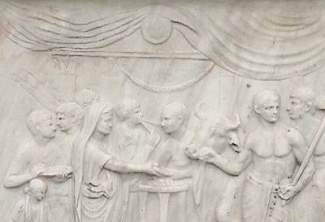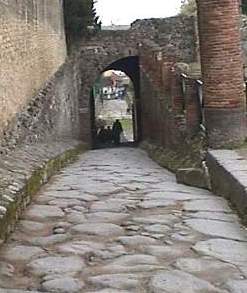A Mysterious Poem
- who is it by?
- when was it written?
- what is it about?

Sicilian Muse, begin a loftier strain!
Tho’ lowly shrubs and trees that shade the plain,
Delight not all; Sicilian Muse, prepare
To make the vocal woods deserve a consul’s care.
The last great age, foretold by sacred rhymes,
Renews its finish’d course; Saturnian times
Roll round again, and mighty years, begun
From their first orb, in radiant circles run.
The base degenerate iron offspring ends;
A golden progeny from heav’n descends:
O chaste Lucina, speed the mother’s pains;
And haste the glorious birth; thy own Apollo reigns!
The lovely boy, with his auspicious face,
Shall Pollio’s consulship and triumph grace;
Majestic months set out with him to their appointed race.
The father banish’d virtue shall restore,
And crimes shall threat the guilty world no more.
The son shall lead the life of gods, and be
By gods and heroes seen, and gods and heroes see.
The jarring nations he in peace shall bind,
And with paternal virtues rule mankind.
Unbidden earth shall wreathing ivy bring,
And fragrant herbs (the promises of spring)
As her first off’rings to her infant king.
The goats, with strutting dugs, shall homeward speed,
And lowing herds secure from lions feed.
His cradle shall with rising flowers be crown’d;
The serpent’s brood shall die: the sacred ground
Shall weeds and pois’nous plants refuse to bear,
Each common bush shall Syrian roses wear.
But when heroic verse his youth shall raise,
And form it to hereditary praise;
Unlabour’d harvests shall the fields adorn,
And cluster’d grapes shall blush on every thorn.
The knotted oaks shall show’rs of honey weep,
And through the matted grass the liquid gold shall creep.
Yet, of old fraud, some footsteps shall remain,
The merchant still shall plough the deep for gain:
Great cities shall with walls be compassed round;
And sharpened shares shall vex the fruitful ground,
Another Typhis shall new seas explore,
Another Argos land the chiefs on th’ Iberian shore.
Another Helen other wars create,
And great Achilles urge the Trojan fate.
And when to ripened manhood he shall grow,
The greedy sailor shall the seas forego;
No keel shall cut the waves for foreign ware;
For every soil shall every product bear.
The lab’ring hind his oxen shall disjoin,
No plough shall hurt the glebe, no pruning hook the vine,
Nor wool shall in dissembl’d colours shine.
But the luxurious father of the fold,
With native purple, or unborrow’d gold,
Beneath his pompous fleece shall proudly sweat,
And under tyrian robes the lamb shall bleat.
The Fates, when they this happy web have spun,
Shall bless the sacred clue, and bid it smoothly run.
Mature in years, to ready honours move,
O of celestial seed! O foster son of Jove!
See, labr’ing Nature calls thee to sustain
The nodding frame of heav’n, and earth, and main;
See, to their base restor’d, earth, seas, and air,
And joyful ages, from behind, in crowding ranks appear,
To sing thy praise, wou’d heav’n my breath prolong,
Infusing spirits worthy such a song;
Not Thracian Orpheus should transcend my lays,
Nor Linus, crown’d with never-fading bays;
Though each his heavenly parent should inspire;
The Muse instruct the voice, and Phoebus tune the lyre.
Should Pan contend in verse, and thou my theme,
Arcadian judges should their God condemn.
Begin, auspicious boy, to cast about
Thy infant eyes, and with a smile, thy mother single out;
Thy mother well deserves that short delight,
The nauseous qualms of ten long months and travel to requite.
Then smile, the frowning infant’s doom is read,
No good shall crown the board, nor goddess bless the bed.
If you have seen Resnais’ film Last Year at Marienbad you may recall the statue. There are three unnamed characters in the film, X, A and M, played by Giorgio Albertazzi, Delphine Seyrig and Sacha Pitöeff. X stands for lover, and A and M for wife and husband couple. X and A find a statue: a man, in classical costume, his arm held forward, but apparently holding back a young woman who is behind him with arm outstretched. There is a dog at their feet. X and A spin their own fantasies about what it could mean. The man has seen some danger. No, it is the woman who has seen the danger. They are at the edge of a cliff. They are exiles, forced to leave their native land. They invent names, Pyrrhus and Andromache, Helen and Agamemnon ...
Later, they are confronted by M:
Excuse me Monsieur. I think I can supply you with some more precise information: this statue represents Charles III and his wife, but it does not date from that period, of course. The scene is that of the oath before the Diet, at the moment of the trial for treason. The classical costumes are purely conventional. (‘Les costumes antiques sont une convention pure.’)The superior knowledge of M destroys the intimacy which X and A have created by letting their imaginations work together. And how often in looking at art would we prefer to follow our own imagination, however many errors it might lead us into, rather than the precise information of the intrusive tour guide or expert friend! This conflict, between what we want to find, and what we are told we must see, is most apparent in the visual arts, but it certainly occurs in poetry. The more we know about a poem, the less free we are to make it mean what we wish, and the less the sense of mystery which it can create for us.
This poem illustrates poetic mystery very well. Perhaps you know at once what the poem is, and where it comes from, but if you do, my guess is that that places you in a fairly small group nowadays. You can find out about it by doing a bit of research, and the truth is, you do not have to do all that much. In fact a couple of judicious web searches will yield the answer, although it is quite easy to go astray ... When you know its provenance, so much of its mystery goes away, but until you do, you can invent your own answers to the following intriguing questions:
- Who is the lovely boy, whose coming is celebrated in the poem? Is it meant to be Jesus? If so, why is Jesus being prophesied in this very classical way? And if not, is the similarity with Jesus deliberate or accidental?
- Who is the author? Does the author know the Jesus story, or the Old Testament prophesies of his coming? Has the author read the poems of Shelley (see below). Is the style classical, with its stately heroic couplets and occasional alexandrines, or romantic, with its sense of excitement and enthusiasm?
- Is the poem good, indifferent or bad? And how much does that depend on the answers to all these other questions?
Finally, we must look at the similarity with Shelley’s immortal chorus from Hellas, which begins,
The world’s great age begins anew,Compare this with the beginning of the mystery poem, which also puts snake with earth a little further on,
The golden years return,
The earth doth like a snake renew
Her winter weeds outworn.
The serpent’s brood shall die: the sacred groundand compare the lines,
Shall weeds and pois’nous plants refuse to bear,
Another Typhis shall new seas explore,with Shelley’s
Another Argos land the chiefs on th’ Iberian shore.
Another Helen other wars create,
And great Achilles urge the Trojan fate.
A loftier Argo cleaves the main,What is going on here? Is Shelley imitating the mystery poem? Is the mystery poem imitating Shelley? Or are these similarities coincidental?
Fraught with a later prize;
Another Orpheus sings again,
And loves, and weeps, and dies.
A new Ulysses leaves once more
Calypso for his native shore.
If you think you have, or feel you need the answer to these questions, email
martin@tartarus.org,
but include your own guesses, which I might include in later revisions
of this page.

Back to the index
